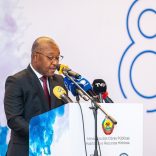AfDB has provided $1.6B in financing to Mozambique since 2015 - Adesina
Japanese aid frozen while talks with IMF continue – AIM report

File photo / A view of Maputo
Japan has frozen about 100 million US dollars worth of grants and loans to Mozambique, in the wake of the scandal over the “hidden loans” to the security-related companies Ematum (Mozambique Tuna Company), Proindicus and MAM (Mozambique Asset Managment).
According to a report in Thursday’s issue of the independent newssheet “Mediafax”, a representative of the Japanese International Cooperation Agency (JICA), Katsuyoshi Sudo, told a Maputo conference on Wednesday on economic relations between Mozambique and Japan that annually Japan has invested between 120 and 140 million dollars in Mozambique, in the form of grants, loans and projects.
But around 100 million dollars of aid is now frozen, and will only be released once Mozambique has reached a new agreement with the International Monetary Fund (IMF).
The loans to the three companies, contracted in 2013 and 2014, amounted to over two billion dollars, and were illicitly guaranteed by the former Mozambican government, under President Armando Guebuza. This added around 20 per cent to Mozambique’s foreign debt, pushing it to unsustainable levels.
When the full extent of this hidden debt was revealed in April 2016, the IMF suspended its programme with Mozambique, and other major donors and funding agencies followed suit.
A pre-condition for the resumption of aid was an independent audit of Ematum, Proindicus and MAM, and to this end the Mozambican Attorney-General’s Office (PGR) hired the London branch of the US company Kroll Associated, reputedly the top forensic auditing company in the world.
The executive summary of the Kroll audit report was released in June, revealing that the management of the three companies sabotaged the audit. Kroll complained that it had not received full cooperation and that the companies had withheld information. The chairperson of all three companies, Antonio do Rosario, who is a senior officer in the State Security and Intelligence Service (SISE), in a message widely circulated on social media, boasted of obstructing the audit, and even of expelling the auditors from his office.
A team from the IMF is currently visiting Mozambique, and the Kroll audit is certainly among the issues it is discussing with the government. The refusal of the three companies to cooperate fully with the audit makes it unlikely that there will be any early resumption of normal relations between Mozambique and the IMF.
Former Prime Minister Luisa Diogo, questioned by journalists on Wednesday at the same conference, said “the crisis is teaching us to be more rational in handling our resources”.
According to “Mediafax”, she hoped that government figures involved in the hidden debts “have learnt a lot from this”. They would now know “how to prioritise, save and use better for tomorrow”.
Diogo was optimistic that the crisis would soon be resolved and that the PGR “will use the information (in the Kroll audit) for what the country needs”.












Leave a Reply
Be the First to Comment!
You must be logged in to post a comment.
You must be logged in to post a comment.